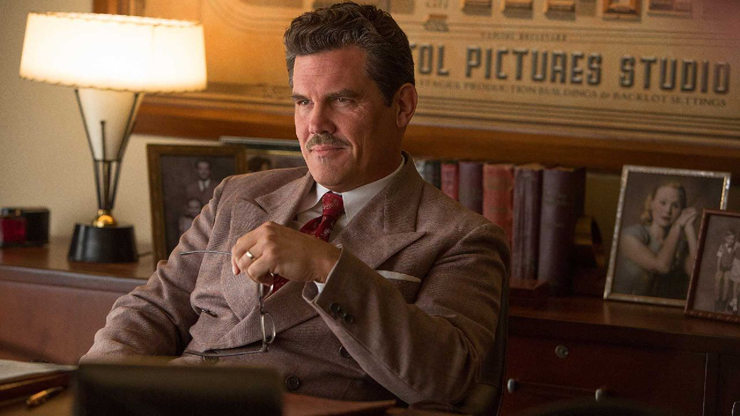
Josh Brolin.
The cinephiles have risen to the defense of Hail, Caesar! “How dare you call it minor Coens?” they railed to the film's detractors, even as Joe Moviegoer continues to give Joel and Ethan Coen's McCarthy-era showbiz satire the cold shoulder. (Estimated third-weekend box office gross: $2.6 million, barely cracking the top 10.)
So where do I fall?
I sat uncomfortably on the fence as I walked out of the press screening, delighted by the peerlessly executed nods to musicals of the 1940s and '50s, yet less than enthused by the threadbare storyline halfheartedly stitching this amusing yet uneven piece of gossamer together. And yet, in the weeks since its debut, it's been occupying my thoughts more than I'd anticipated. This is not unprecedented when you keep in mind who's calling the shots.
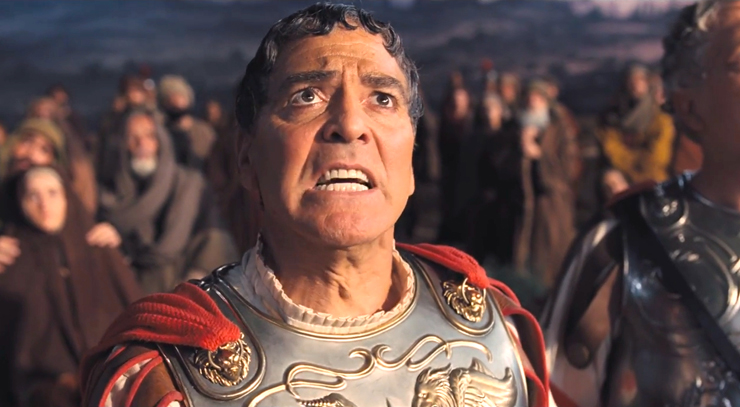
George Clooney.
The thing about the Coens' work, whether they're in dead-serious mode (hello, No Country for Old Men) or goofing off like they are here, is that you have to let their work marinate. Upon revisiting their films, one finds more layers just waiting to be uncovered. Unsurprisingly, a few weeks later, this buoyant, occasionally flat-footed comedy is sitting well, despite my issues. It's clear this defiantly uncommercial studio release holds little appeal to mainstream audiences expecting a more straightforward ode to the studio system, but to dismiss it straight away as a footnote in the Coens' body of work is a little unfair.
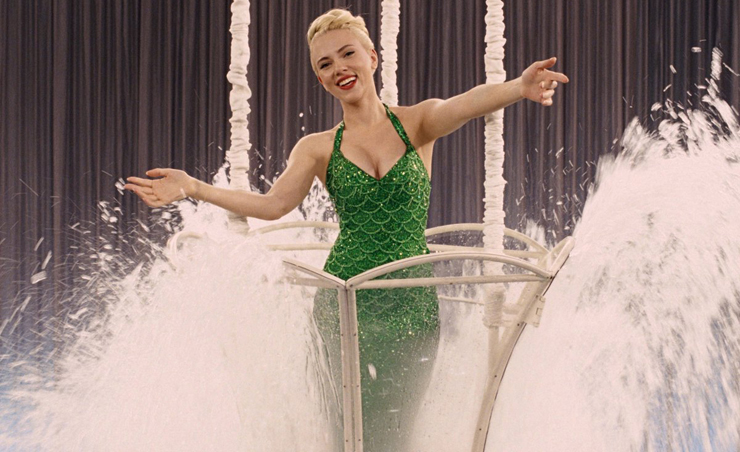
Scarlett Johansson.
Hail, Caesar! unfolds as a series of vignettes mostly set inside the offices and sound stages of Capitol Pictures, the (fictional) movie studio housing a series of stars and filmmakers based on some iconic Hollywood figures. Contrary to what the ad campaigns would suggest, the star of the film is not George Clooney, here playing a self-absorbed variation on a Coens' doofus. The film is predominantly told from the point of view of (real-life) “fixer” Eddie Mannix, a showbiz variation on Clooney's Michael Clayton's conflicted problem solver. Mannix, portrayed by a perfectly cast Josh Brolin, is a man of faith … to Catholicism, sure, but also to the studio system, in which he nimbly juggles several ongoing crisis like an acrobat. In the movie's opening scene, he's confessing his sins to a priest who appears to be fed up with the frequent late-night visitor. Mannix, you see, is mulling a cushy executive job offered by the Lockheed Corporation. Regular hours, better salary, and a front seat to the World of Tomorrow. Besides, the Lockheed headhunter argues, movies are yesterday's news.
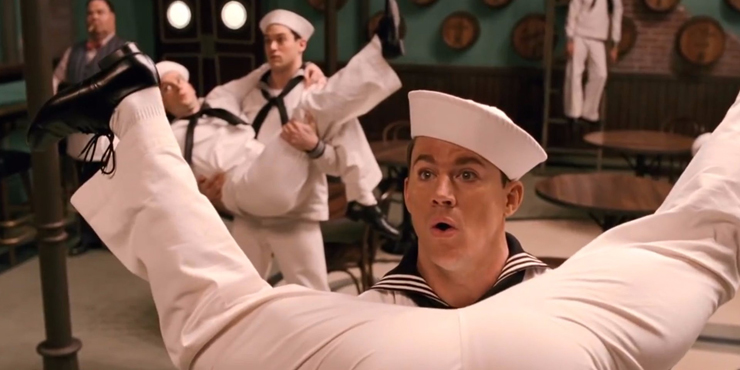
Channing Tatum.
Not if “The Future” has any say. Um, come again? Calling themselves “The Future,” a clandestine group with leftist leanings drugs and kidnaps vain A-lister Baird Whitlock (Clooney) right as he's almost done wrapping up the titular sword-and-sandals Bible epic on which the cash-strapped studio's hopes are riding. (Whitlock plays a Roman army officer moved by the Jew on the cross, not unlike the Richard Burton's role in The Robe, in this film-within-a-film.) It might sound substantial enough on the page, but the closest thing Hail, Caesar! has to an actual plot has the weight of cotton candy, the better for the Coens to peek in on Capitol's sound stages to get a glimpse of, say, the Esther Williams-esque DeeAnna Moran (Scarlett Johansson) pulling off Busby Berkley-esque synchronized swimming, or in the film's most charming sequence, twinkle-toed Gene Kelly stand-in Burt Gurney (Channing Tatum) dazzling us with a flawless Navy-sailors-on-leave number that channels Vincente Minnelli and adds a dash of Jean Genet for good measure. The whole thing is cartoonishly homoerotic (think Anchors Aweigh meets Querelle ultra-lite). Not bad for a couple of straight boys.
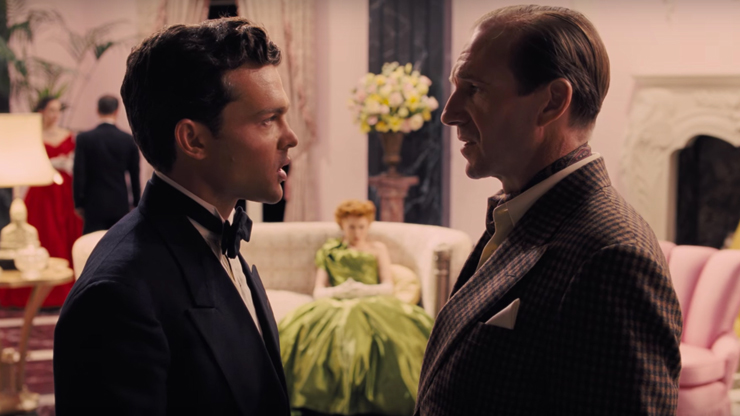
(from left): Alden Ehrenreich, Ralph Fiennes.
Perhaps the most entertaining narrative strand, however, revolves around western matinee idol Hobie Doyle (Alden Ehrenreich), painfully out of his element after studio heads order him as a last-minute addition to the cast of the latest comedy of manners by Laurence Laurentz (an agreeably exasperated Ralph Fiennes). The Coens show off crack comic timing and mad editing chops when cutting back and forth between Fiennes and Ehrenreich as Laurentz tries to get the fish-out-of-water actor to recite an upper-crust-sounding line of dialogue (“would that it were so simple”) that's simply beyond the young thespian's capabilities. Later in the film, as Mannix sees Laurentz's dailies from that day's shoot, and it's clear the Coens have nailed Ernst Lubitsch's light touch, even though this impeccably rendered black and white pastiche feels more like something from the 1930s and not the '50s, where the film is set.
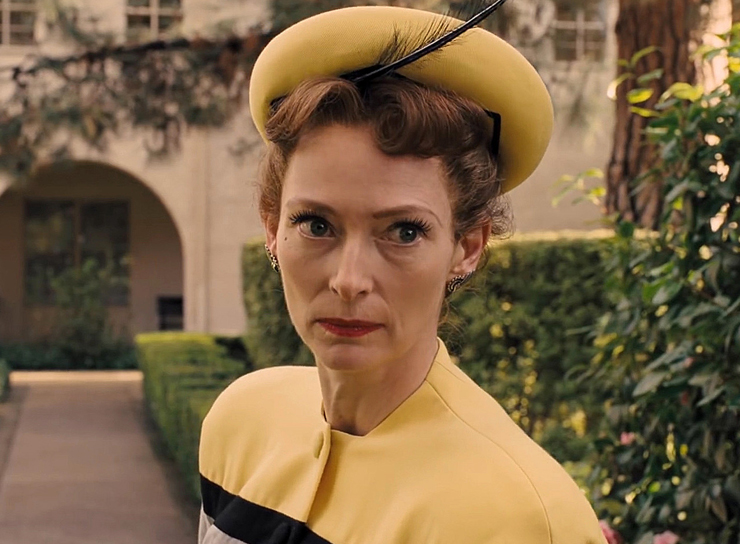
Tilda Swinton.
As you may have noticed, the pleasures in Hail Caesar! come in spurts. The problem is not so much the loose variety-show structure, though I'm certain the film would have been stronger if the Clooney storyline had been more compelling. What prevents the film from flowing more smoothly is that, unlike other films the Coens have directed together, it doesn't feel like the siblings are working as one. Careening from lowbrow gags to a more high-minded meditation on faith and Tinseltown politics, it often feels as if Ethan is steering the film in a broader direction and Joel is working overtime to rein in those daffy flourishes. The push-pull nature of their direction here has been construed as lazy and scattershot, but while it often works against the film, it seems to me, upon reflection, that they have obsessively considered every frame, even though they might not be on the same page in terms of tone.
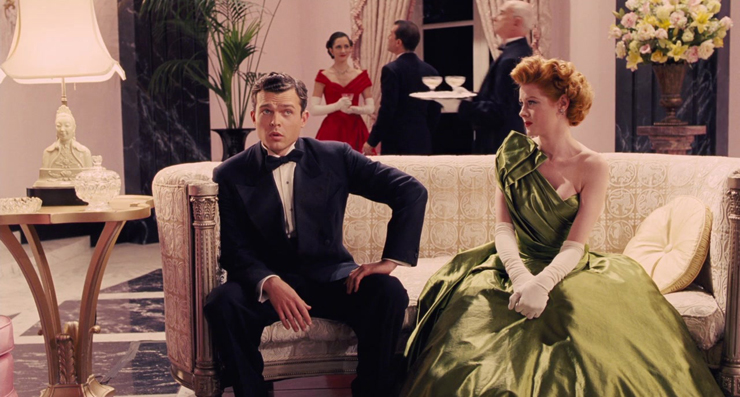
(from left): Alden Ehrenreich, Emily Beecham.
And yet, despite such lapses as totally wasting Tilda Swinton, all dressed up with nowhere to go as rival twin gossip columnists, or opting not to devote more screen time to Ehrenreich (the real find here), Hail, Caesar! sneakily comes together in the end. Rather than allowing viewers to lose themselves in these celluloid fantasies, the Coens force them to acknowledge the artifice. In their portrait, Capitol Pictures is hardly a dream factory where movie magic occurs. When DeeAnna is doing her number, for instance, they fixate on Johansson's face, her wheels visibly spinning as she thinks about the next step in her choreography. Also, in one of the final scenes, as Clooney recites his bombastic lines to a crowd of Roman extras, the Coens do something really interesting. Instead of staying within the world of their religious epic, they cut to faces in the crew: the script girl, the camera operator, and so forth. The dream factory might be lorded over by the money men, the filmmakers seem to say, but it's the unheralded people behind the scenes that keep this machine well oiled. It's a gently subversive message that shines through whenever this pleasant valentine to the studio system, and the dedicated workaholics who run it, snaps into focus.
 MAIN MENU
MAIN MENU

